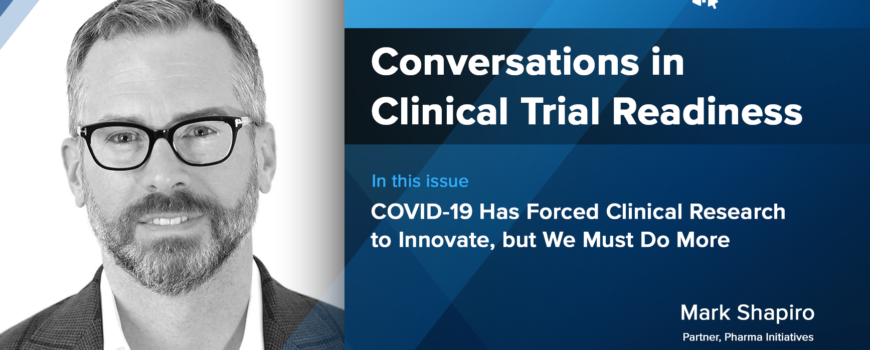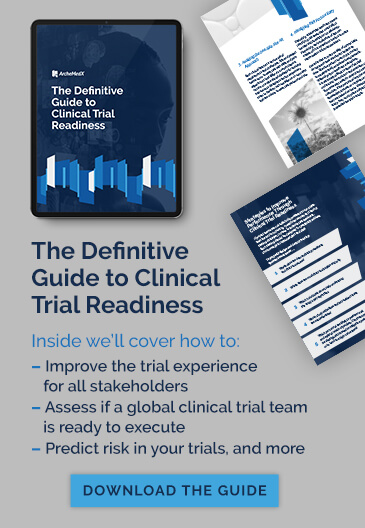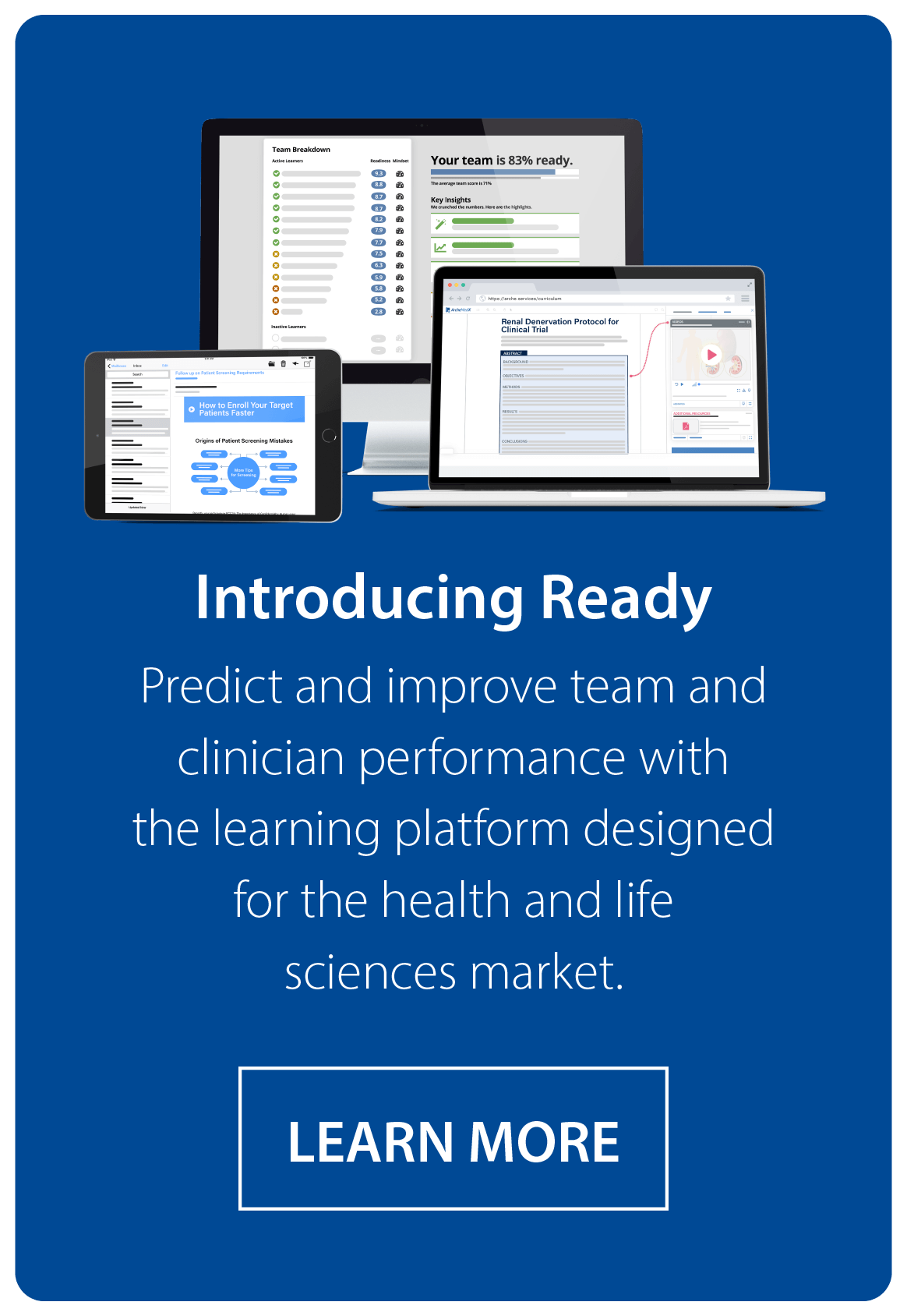
We recently spoke with Mark Shapiro, Partner at Pharma Initiatives, a specialty consultancy focused on solving the operational challenges standing between biopharma leaders and their strategic goals. The company is based in Chapel Hill, NC. Here are some of the best excerpts from the conversation:
ArcheMedX:
After spending a large amount of your career in research, and then the CRO space, you’ve now shifted your focus to innovation. Why do clinical research groups find this so hard to do today?
Shapiro:
Innovation is really hard in the clinical research industry because it is so heavily regulated. Embedded processes created to comply with regulations become fixed, and once established, very hard to change. For the past 15 years, systems have been layered on established processes in a way that further cements the way people think about how things must be done. The stakes in medical research are high; being very risk-averse, we’re all reluctant to change things that are well established and proven. Thus, this is an industry that has been years behind other parts of the economy in the adoption of new technology.
Especially on the CRO side, companies are not set up to innovate because margins are so tight. And that’s difficult to change: not a lot of free cash flow in a CRO to establish and fund an innovation team. Yet, we know the old approaches place an undue burden on stakeholders – like doctors doing trials. We make the process so hard for doctors, that many don’t even want to participate.
ArcheMedX:
COVID-19 has forced some level of innovation – at least temporarily. So where do you think true disruption will happen in clinical research as a result?
Shapiro:
Everyone has had to shift their business model. If a medical practice didn’t have telemedicine, they had to implement it very rapidly or face bankruptcy. And now people–patients, doctors, researchers, and regulators–have realized that this shift is truly possible. They’ve realized that not everything that was done in the office has to be done in the office.
The other trend that I’ve seen is that digital and connected medicine is beginning to become a focus for FDA compliance with interface standardization. The COVID trials that are out there will probably use more of these connected devices. But I also expect that more outpatient research, such as studies focused on chronic conditions will be early adopters of consumer technology. People are already managing these chronic conditions at home. And with that trend, we’ll see an acceptance of more patient-reported outcomes.
ArcheMedX:
The industry has had to shift because of COVID-19. But you mentioned the FDA – where have they made changes that will have lasting impact?
Shapiro:
The FDA has done a good job on efficacy, and they’ve assumed this mantle of leadership around innovation. I think there are many more people at the FDA now thinking about how these new technologies can give them new tools to do what they want to do, which is to protect the public health. They’ve also realized that they need to lead these changes because this business is so risk-averse.
One example I can think of is that the FDA has released the MyStudies app, and what they’re trying to do is give people who have a smartphone a validated data exchange. This way, people could get their health data from an app into a study. The FDA really seems to be interested in discovering if there is data available in the mobile app ecosystem that can keep the public safe and contribute to the detection of safety or efficacy signals.

ArcheMedX:
With all of these opportunities to adopt things like consumer technology, what negative impacts do you see?
Shapiro:
With COVID, there’s been incredible damage to the healthcare system. The payment cycles are long so the full impact of the pandemic hasn’t yet been felt, but you can expect this disruption to shut down many already struggling healthcare businesses.. This only accelerates the trend that more and more Americans lack convenient access to high quality healthcare, including clinical research.
If the practices are substantially damaged, clinical research gets cut back, because it is often considered non-core. Practices are business, and they need to focus on things that bring money in, which can mean furloughs for clinical research and other administrative personnel. In oncology, people who can afford to do so often go out of town to seek the best care, including clinical trials. Traveling to this flagship care can further drain the resources of local and regional health systems.
So, I think we can do more with technology to bring flagship medicine to other areas of the country. We need to make clinical research more available. How do we bring access to top notch care to everyone? Technology is the key, in a way that’s not burdensome or expensive.
COVID is forcing a reckoning in our healthcare system, but this has been going on for more than a decade…it’s forcing our industry to think “how do we use technology to bring top notch care and clinical trials care the 50% of Americans that don’t live near major centers of clinical research?”
ArcheMedX:
So what are the barriers going to be to adoption of virtual technologies?
Shapiro:
Changing billing to encourage telemedicine is happening, and must happen in order to allow adoption. Because of COVID, people can bill for things that they couldn’t before.
Another barrier will be getting people comfortable with things like – what can we truly do on video? Do we need to video-record the taking of a medication? How do we know someone truly took the medicine? How can we be sure we’re interacting with the actual patient? And there’s more to uncover.
Home health has really exploded…but for trials like COVID vaccines, home visits can be risky. It can be expensive to protect the home health personnel. How does this scale? There is a responsibility on us in this business to find a way to make this work.
ArcheMedX:
Some of these changes are very long term. So thinking short term, the next 3-6 months, what are the priority focus areas for clinical operations professionals?
Shapiro:
First, clinical operations executives need to look at the tools, processes, and procedures around adapting the business for remote visits. For example, we both know that trials have gotten a lot more complex in the last 10-15 years, so a lot of our meetings, like investigator meetings, have become longer and more intensive to communicate the information that is necessary. It’s hard to keep PIs focused on a 3-day web meeting–not to mention the cost to a medical practice when they forgo several days of billable clinical care.
So how can you use technology to improve remote learning? Flexible learning makes the protocol more consumable…let practitioners watch how something is done in a trial, because that’s how they learn in medical school. Why not do more of that instead of a 3-day powerpoint presentation? There is a need to teach more effectively in a clinical trial, and adopting technology is the way we can do that with interactive video and e-learning.
Also, most companies didn’t have a pandemic risk plan in place. But maybe we need to be doing this as an industry standard. ICH E6(R2) mandated pre-planning for potential risks. In my career, we’ve gone through both SARS and MeRS, before COVID-19, and trials all over the world were impacted in different ways. The lesson is, these things happen every few years–it is the magnitude that is largely unpredictable. This could have been worse. Let’s be better prepared for the next one.
ArcheMedX:
As Mark explained, the clinical research industry is experiencing a forced disruption of process. In order to emerge better equipped for future pandemics, or other major impacts, our industry must enact real changes. The good news is that many of these changes are in reach, like the flexible learning that Mark described, which ArcheMedX can help to implement.





